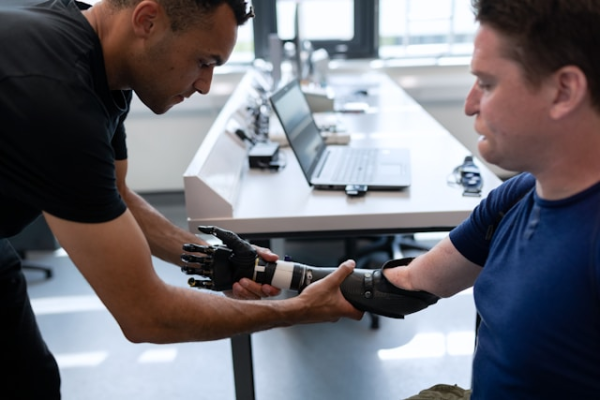A Guide to Telehealth Jobs: What Allied Health Locum Roles Can Now Be Done Remotely

The rise of telehealth has given the healthcare industry a new, more streamlined, way to deliver care to patients remotely. This has not only been a huge benefit for patients and an already overburdened industry - there are now more opportunities available for locum workers in allied health fields. So, this article will offer you a guide to the latest telehealth jobs in allied health that locums can perform remotely.
The Expansion of Telehealth
Telehealth involves the use of digital information and communication technologies, such as computers and mobile devices, to access healthcare services remotely and manage healthcare. This approach has become increasingly important, particularly in providing continuous healthcare amidst challenges like the COVID-19 pandemic. For allied health professionals, telehealth has opened up new avenues for locum roles, which are temporary positions that healthcare professionals can fill on an as-needed basis.
Allied Health Locum Roles Suitable for Remote Work
Allied health professions are becoming more important as their expertise has been implemented into modern health and social care services. These roles are becoming more flexible with the rise of telehealth, allowing for professionals in these specialisms to work remotely. Below are a few of the latest allied health locum roles that are suitable for remote work:
1. Speech-Language Therapy
Speech-language therapists can conduct patient assessments, provide therapy, and monitor progress remotely using video conferencing tools. This role is particularly well-suited to telehealth, as it often requires observing and interacting with patients rather than physical contact.
2. Occupational Therapy
Occupational therapists can effectively deliver certain therapies and assessments remotely, focusing on the development of skills and the use of therapeutic activities to enhance patient participation in daily tasks. Remote occupational therapy often involves guiding patients through exercises and activities via video and providing virtual consultations.
3. Physiotherapy
While some aspects of physiotherapy require hands-on interaction, many exercises and follow-up consultations can be conducted remotely. Physiotherapists can demonstrate exercises, make corrections, and assess progress through virtual sessions.
4. Dietetics
Dietitians can provide consultations and follow-ups via telehealth platforms, offering dietary plans and lifestyle advice based on patient's medical conditions and personal goals. Much of the work of a dietitian focuses on clinical calculations, which makes remote work a great environment for the role.
5. Audiology
Some elements of audiology, such as counselling for hearing aid users and initial screenings, can now be conducted remotely. By leveraging specialised software and hearing tests that patients can perform at home, audiologists can conduct a good portion of their job via telehealth.
Benefits of Telehealth in Allied Health
As we’ve touched on above, telehealth as a service has a wealth of benefits for the healthcare industry and patients alike. There are also several potent benefits of telehealth for those who work in allied health professions, making it an attractive working arrangement. Below are a few of the biggest advantages of telehealth in allied health:
Accessibility and Convenience
Telehealth dramatically increases accessibility, allowing patients in remote or underserved locations to receive specialised services without the need to travel. This improves the outcomes of patients and gives allied health professionals a more impactful role in their healthcare. It also offers healthcare professionals the flexibility to work from various locations, potentially reducing travel time and costs associated with locum roles.
Work-Life Balance
Remote allied health positions can offer better work-life balance, allowing professionals to manage their schedules more effectively and spend less time commuting. With burnout being a common occurrence in healthcare, the ability to strike a better work-life balance is a huge benefit for allied healthcare professionals.
Continuity of Care
Telehealth enables continuous patient care, which is particularly important for chronic conditions and long-term therapy, ensuring that treatment remains consistent and uninterrupted. Much like the enhanced accessibility that telehealth offers, a reliable service allows allied health professionals to do more through their work for patients.
Skills Needed for Remote Allied Health Professionals
Although telehealth can bring a lot of benefits to the work that allied health professionals do, there is a bit of a learning curve involved with adopting the new technology. Below are some of the core skills that are useful to have when transitioning towards telehealth in an allied healthcare setting:
Technological Proficiency
Professionals must be comfortable with various digital tools and platforms used in telehealth, from electronic health records to video conferencing software. Technological proficiency will ensure that patients receive adequate treatment remotely and that allied health professionals can perform their duties without issue.
Communication Skills
Strong verbal and written communication skills are essential for explaining treatments, conducting assessments, and building patient relationships remotely. This is especially true when discussing things virtually, as the lack of direct interaction can make it harder to convey certain things.
Adaptability
Adapting treatments to fit the limitations and possibilities of remote delivery requires creativity and flexibility from healthcare providers. As these professionals will be working remotely and digitally, many aspects of the role will have to be adjusted to work in this new environment.
The Future of Allied Health Harnesses Telehealth
The expansion of telehealth has opened a new frontier for allied health professionals. While certain locum roles are more adaptable to remote work than others, the increasing sophistication of telehealth technology continues to broaden the possibilities. As this field evolves, it provides an exciting opportunity for allied health professionals looking to expand their horizons and embrace the flexibility offered by remote work. If you’re interested in finding locum telehealth roles, then our team at Globe Locums would love to help. Please take a look at our latest vacancies today or speak with us for more details.

Latest Physiotherapist Jobs
We currently have a variety of locum and permanent vacancies across the UK and Ireland





